高中英语语法倒装句讲解及练习(教师版)
- 格式:doc
- 大小:66.00 KB
- 文档页数:5
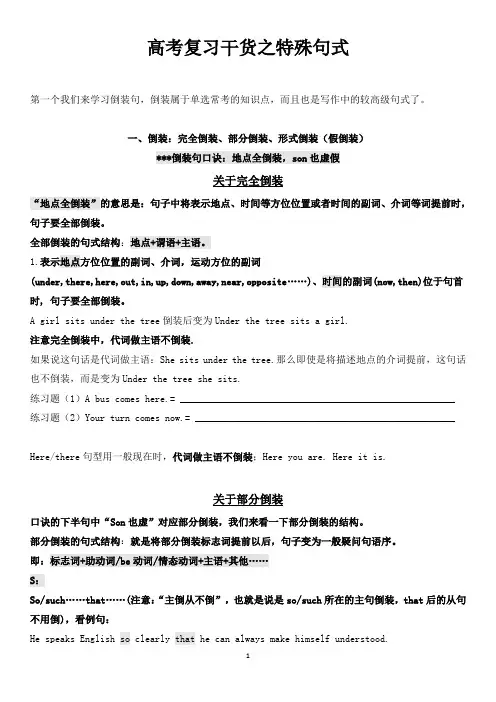
第一个我们来学习倒装句,倒装属于单选常考的知识点,而且也是写作中的较高级句式了。
一、倒装:完全倒装、部分倒装、形式倒装(假倒装)***倒装句口诀:地点全倒装,son也虚假关于完全倒装“地点全倒装”的意思是:句子中将表示地点、时间等方位位置或者时间的副词、介词等词提前时,句子要全部倒装。
全部倒装的句式结构:地点+谓语+主语。
1.表示地点方位位置的副词、介词,运动方位的副词(under,there,here,out,in,up,down,away,near,opposite……)、时间的副词(now,then)位于句首时, 句子要全部倒装。
A girl sits under the tree倒装后变为Under the tree sits a girl.注意完全倒装中,代词做主语不倒装.如果说这句话是代词做主语:She sits under the tree.那么即使是将描述地点的介词提前,这句话也不倒装,而是变为Under the tree she sits.练习题(1)A bus comes here.= _______________________________________________________ 练习题(2)Your turn comes now.= ____________________________________________________Here/there句型用一般现在时,代词做主语不倒装;Here you are. Here it is.关于部分倒装口诀的下半句中“S on也虚”对应部分倒装,我们来看一下部分倒装的结构。
部分倒装的句式结构:就是将部分倒装标志词提前以后,句子变为一般疑问句语序。
即:标志词+助动词/be动词/情态动词+主语+其他……S:So/such……that……(注意:“主倒从不倒”,也就是说是so/such所在的主句倒装,that后的从句不用倒),看例句:He speaks English so clearly that he can always make himself understood.=so是标志词,所以so clearly这个意群提前(举个例子来说意群:一辆出租车来了=来了一辆出租车,其中“一辆出租车”这几个字不能拆分,它就是一个意群),然后再将主句调整为上边说的部分倒装句式结构。
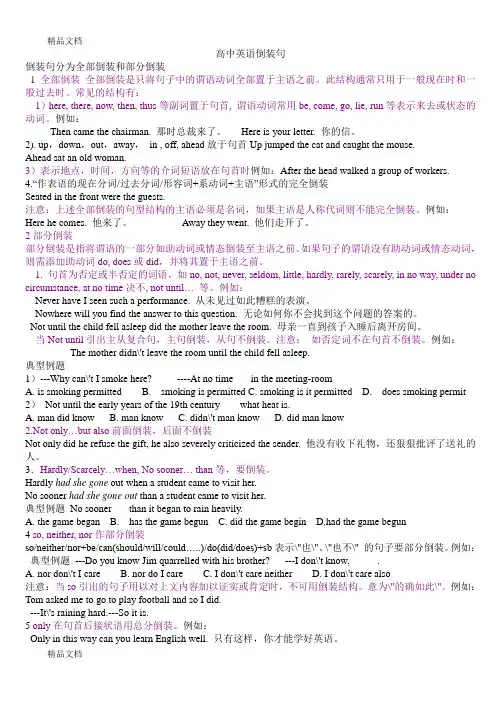
高中英语倒装句倒装句分为全部倒装和部分倒装1全部倒装全部倒装是只将句子中的谓语动词全部置于主语之前。
此结构通常只用于一般现在时和一般过去时。
常见的结构有:1)here, there, now, then, thus等副词置于句首, 谓语动词常用be, come, go, lie, run等表示来去或状态的动词。
例如:Then came the chairman. 那时总裁来了。
Here is your letter. 你的信。
2). up,down,out,away,in , off, ahead放于句首Up jumped the cat and caught the mouse.Ahead sat an old woman.3)表示地点,时间,方向等的介词短语放在句首时例如:After the head walked a group of workers.4.“作表语的现在分词/过去分词/形容词+系动词+主语”形式的完全倒装Seated in the front were the guests.注意:上述全部倒装的句型结构的主语必须是名词,如果主语是人称代词则不能完全倒装。
例如:Here he comes. 他来了。
Away they went. 他们走开了。
2部分倒装部分倒装是指将谓语的一部分如助动词或情态倒装至主语之前。
如果句子的谓语没有助动词或情态动词,则需添加助动词do, does或did,并将其置于主语之前。
1. 句首为否定或半否定的词语,如no, not, never, seldom, little, hardly, rarely, scarely, in no way, under no circumstance, at no time决不, not until… 等。
例如:Never have I seen such a performance. 从未见过如此糟糕的表演。
Nowhere will you find the answer to this question. 无论如何你不会找到这个问题的答案的。
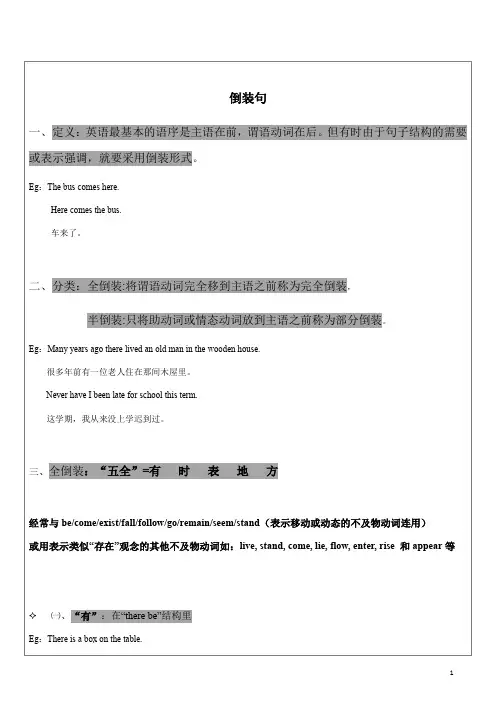
倒装句一、定义:英语最基本的语序是主语在前,谓语动词在后。
但有时由于句子结构的需要或表示强调,就要采用倒装形式。
Eg:The bus comes here.Here comes the bus.车来了。
二、分类:全倒装:将谓语动词完全移到主语之前称为完全倒装,半倒装:只将助动词或情态动词放到主语之前称为部分倒装。
Eg:Many years ago there lived an old man in the wooden house.很多年前有一位老人住在那间木屋里。
Never have I been late for school this term.这学期,我从来没上学迟到过。
三、全倒装:“五全”=有时表地方经常与be/come/exist/fall/follow/go/remain/seem/stand(表示移动或动态的不及物动词连用)或用表示类似“存在”观念的其他不及物动词如:live, stand, come, lie, flow, enter, rise 和appear等㈠、“有”:在“there be”结构里Eg:There is a box on the table.桌子上面有一个盒子。
✧㈡、“时”:表示时间副词,如:now,then,Eg:Now comes your turn.现在轮到你了。
✧㈢、“表”:表语放句子前,“表语+系动词+主语”的结构Eg:Present at the party were Mr. Green and many other guests.格林先生和其他的客人在这个聚会上。
Seated on the ground are a group of young men.一群年轻人坐在了地上。
✧㈣、“地”:地点状语放在句首Eg:In south of the river lies a small factory.小工厂位于河的南方。
From the valley came a cry.山谷传来一阵哭声。
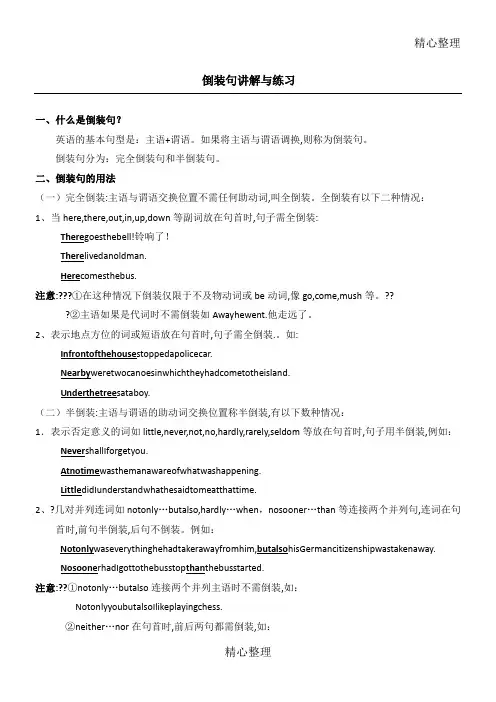
精心整理倒装句讲解与练习一、什么是倒装句?英语的基本句型是:主语+谓语。
如果将主语与谓语调换,则称为倒装句。
倒装句分为:完全倒装句和半倒装句。
二、倒装句的用法1注意212、?时,前句半倒装,后句不倒装。
例如:Notonly waseverythinghehadtakerawayfromhim,butalso hisGermancitizenshipwastakenaway.Nosoone rhadIgottothebusstop than thebusstarted.注意:??①notonly…butalso连接两个并列主语时不需倒装,如:NotonlyyoubutalsoIlikeplayingchess.②neither…nor在句首时,前后两句都需倒装,如:Neither doIhaveasister nor doesmyhusband.3、only放在句首强调状语时,主句用半倒装。
例如:Onlythen didIrealizethatIwaswrong.Onlyinthisway canIlearnfrommyfault.Onlywhenthewarwasoverin1918washeabletogetbacktowork.注意:only强调主语不倒装:如Onlytheteacherscanusetheroom.4、so…that句型,so放在句首时,主句用倒装结构,that从句不用倒装。
例如:5.倒装句练习题1.HismotherhadtalkedtohimformanyminuteswhilehewaswatchingTV,but____.A.alittledidhehear??B.littledidhehear??C.littleheardhe??D.alittleheardhe2.——Hello,ZhuHua.I’llhavetoreturntoCanadabecauseI’veworkedhereforayear. ——_____!A.Whattimeflies??B.Howtimeflies??C.Whatdoestimefly??D.Howdoestimefly3.Duringthewar,____butalsohelosthiswifeandhischild.4.6.10.——Whatsportdoyoulikebest?——Springboarddiving(跳板跳水).___todiveintowaterfromhighboard!A.Whatafunisit??B.Howfunitis??C.Howafunisit??D.Whatfunitis11.——Theoldmanwouldn’tstayathomeforarestevenifitrained.——____.Hewouldfeelsickifhestayedhomeforoneday.A.Sowouldmygrandpa???B.Sowouldn’tmygrandpaC.Neitherwouldmygrandpa??????D.Norwouldn’tmygrandpa12.___forustosurf(冲浪)ontheseainsummer!A.Whatexcitingisit??B.Howexcitingisit?C.Whatexcitingitis??D.Howexcitingitis13.Bynomeans___toourplanforthetrip.A.willsheagree??B.shewillagree??C.agreesshe??D.willagreeshe14.Thechildtiptoed(翘起脚尖走)quietlytothebird.___intotheforestwhenhewasabouttocatchit.A.Flewitaway??B.Awayflewit??C.Awayitflew??D.Flewawayit16.18.21.A.liesaverydeepvalley??B.doesaverydeepvalleylieC.averydeepvalleylies??D.averydeepvalleylays23.Theywentintoasmallhousebut___.A.nopersonsdidtheyfind????????B.notapersonfoundtheyC.notapersondidtheyfind???????D.notapersontheyfound24.——Mymotherdoesalotofhouseworkbeforegoingtowork,butshehasneverbeenlate.——_____.A.Sodoesmymother?B.Neitherdoesmymother?C.Norhasmymother?D.Soitiswithmymother25.Everyonehasarrivedateightand____.A.thendoesthemeetingbegin??B.thenbeginsthemeetingC.beginsthemeetingthen???????D.doesthemeetingbeginthen26.__itisforustoseethathedoeshisworksowell!28.30.33.MothertoldRosetobuysomesugarinthesupermarketand___.A.shedidso????B.soshedid??????C.sodidshe???????D.shedidsuch34.___shortlyafteritstoppedraining.A.Thereappearedacolorfulrainbowinthesky?B.IntheskydidacolorfulrainbowappearC.Thereacolorfulrainbowappearedinthesky?D.Thereintheskyacolorfulrainbowappeared35.Afterthepatientswentintotheoffice,__working.A.onlyadoctordidtheysee???B.onlyadoctorsawtheyC.onlyadoctortheysaw???????D.onlyadoctorhadtheyseen36.Wehavelookedforthelostsheepalmosteverywhere,butnowhere_____.A.wecanfindit???B.canwefindit???C.canfindweit???D.wecanitfind37.Onlysincetheygaveupthatgoodchance___toshowtheirinventionagain.39.40.A.sodoI????B.sowillI???C.nordoI???D.norwillI44.Sinceeveryonehascomebackhere,___.A.ongoesourdiscussion?????B.goesonourdiscussionC.ondoesourdiscussiongo??D.doesonourdiscussiongo45.__whenwepassedbyitsnest.A.Upintotheblueskydidthebirdfly?????B.UpintotheblueskythebirdflewC.Upintotheblueskyflewthebird????????D.Flewupintotheblueskythebird参考答案及讲解1.B。
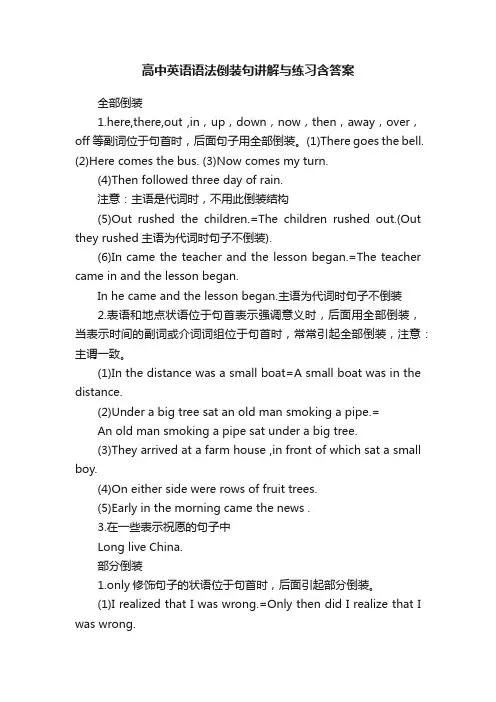
高中英语语法倒装句讲解与练习含答案全部倒装1.here,there,out ,in,up,down,now,then,away,over,off等副词位于句首时,后面句子用全部倒装。
(1)There goes the bell.(2)Here comes the bus. (3)Now comes my turn.(4)Then followed three day of rain.注意:主语是代词时,不用此倒装结构(5)Out rushed the children.=The children rushed out.(Out they rushed主语为代词时句子不倒装).(6)In came the teacher and the lesson began.=The teacher came in and the lesson began.In he came and the lesson began.主语为代词时句子不倒装2.表语和地点状语位于句首表示强调意义时,后面用全部倒装,当表示时间的副词或介词词组位于句首时,常常引起全部倒装,注意:主谓一致。
(1)In the distance was a small boat=A small boat was in the distance.(2)Under a big tree sat an old man smoking a pipe.=An old man smoking a pipe sat under a big tree.(3)They arrived at a farm house ,in front of which sat a small boy.(4)On either side were rows of fruit trees.(5)Early in the morning came the news .3.在一些表示祝愿的句子中Long live China.部分倒装1.only修饰句子的状语位于句首时,后面引起部分倒装。
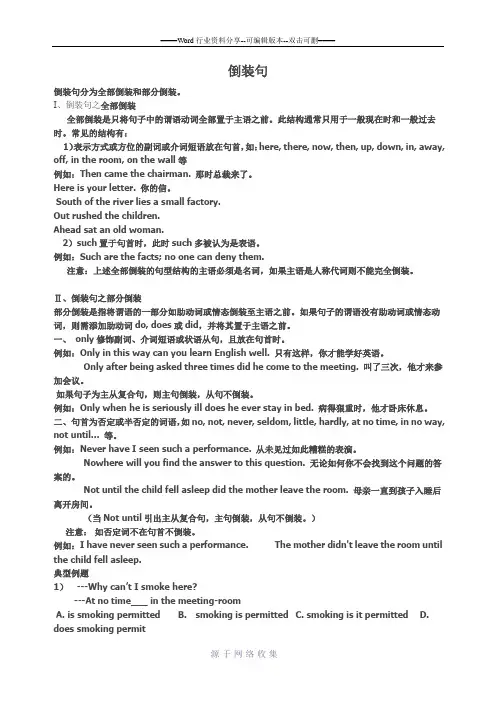
倒装句倒装句分为全部倒装和部分倒装。
I、倒装句之全部倒装全部倒装是只将句子中的谓语动词全部置于主语之前。
此结构通常只用于一般现在时和一般过去时。
常见的结构有:1)表示方式或方位的副词或介词短语放在句首,如:here, there, now, then, up, down, in, away, off, in the room, on the wall等例如:Then came the chairman. 那时总裁来了。
Here is your letter. 你的信。
South of the river lies a small factory.Out rushed the children.Ahead sat an old woman.2)such置于句首时,此时such多被认为是表语。
例如:Such are the facts; no one can deny them.注意:上述全部倒装的句型结构的主语必须是名词,如果主语是人称代词则不能完全倒装。
Ⅱ、倒装句之部分倒装部分倒装是指将谓语的一部分如助动词或情态倒装至主语之前。
如果句子的谓语没有助动词或情态动词,则需添加助动词do, does或did,并将其置于主语之前。
一、only修饰副词、介词短语或状语从句,且放在句首时。
例如:Only in this way can you learn English well. 只有这样,你才能学好英语。
Only after being asked three times did he come to the meeting. 叫了三次,他才来参加会议。
如果句子为主从复合句,则主句倒装,从句不倒装。
例如:Only when he is seriously ill does he ever stay in bed. 病得狠重时,他才卧床休息。
二、句首为否定或半否定的词语,如no, not, never, seldom, little, hardly, at no time, in no way, not until… 等。
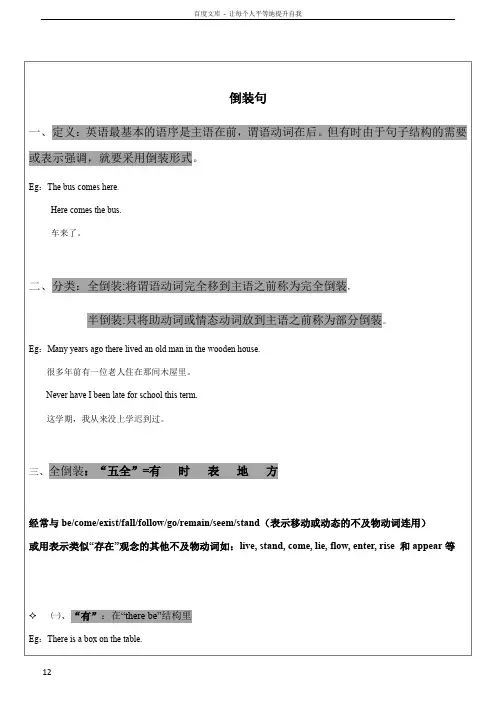
倒装句一、定义:英语最基本的语序是主语在前,谓语动词在后。
但有时由于句子结构的需要或表示强调,就要采用倒装形式。
Eg:The bus comes here.Here comes the bus.车来了。
二、分类:全倒装:将谓语动词完全移到主语之前称为完全倒装,半倒装:只将助动词或情态动词放到主语之前称为部分倒装。
Eg:Many years ago there lived an old man in the wooden house.很多年前有一位老人住在那间木屋里。
Never have I been late for school this term.这学期,我从来没上学迟到过。
三、全倒装:“五全”=有时表地方经常与be/come/exist/fall/follow/go/remain/seem/stand(表示移动或动态的不及物动词连用)或用表示类似“存在”观念的其他不及物动词如:live, stand, come, lie, flow, enter, rise 和appear等㈠、“有”:在“there be”结构里Eg:There is a box on the table.桌子上面有一个盒子。
✧㈡、“时”:表示时间副词,如:now,then,Eg:Now comes your turn.现在轮到你了。
✧㈢、“表”:表语放句子前,“表语+系动词+主语”的结构Eg:Present at the party were Mr. Green and many other guests.格林先生和其他的客人在这个聚会上。
Seated on the ground are a group of young men.一群年轻人坐在了地上。
✧㈣、“地”:地点状语放在句首Eg:In south of the river lies a small factory.小工厂位于河的南方。
From the valley came a cry.山谷传来一阵哭声。
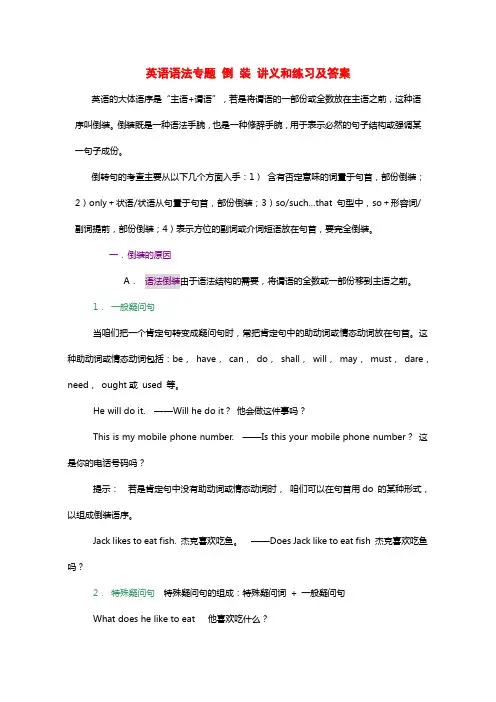
英语语法专题倒装讲义和练习及答案英语的大体语序是“主语+谓语”,若是将谓语的一部份或全数放在主语之前,这种语序叫倒装。
倒装既是一种语法手腕,也是一种修辞手腕,用于表示必然的句子结构或强调某一句子成份。
倒转句的考查主要从以下几个方面入手:1)含有否定意味的词置于句首,部份倒装;2)only+状语/状语从句置于句首,部份倒装;3)so/such…that句型中,so+形容词/副词提前,部份倒装;4)表示方位的副词或介词短语放在句首,要完全倒装。
一.倒装的原因A.语法倒装由于语法结构的需要,将谓语的全数或一部份移到主语之前。
1.一般疑问句当咱们把一个肯定句转变成疑问句时,常把肯定句中的助动词或情态动词放在句首。
这种助动词或情态动词包括:be,have,can,do,shall,will,may,must,dare,need,ought或used 等。
He will do it. ——Will he do it?他会做这件事吗?This is my mobile phone number. ——Is this your mobile phone number?这是你的电话号码吗?提示:若是肯定句中没有助动词或情态动词时,咱们可以在句首用do 的某种形式,以组成倒装语序。
Jack likes to eat fish. 杰克喜欢吃鱼。
——Does Jack like to eat fish 杰克喜欢吃鱼吗?2.特殊疑问句特殊疑问句的组成:特殊疑问词+ 一般疑问句What does he like to eat 他喜欢吃什么?When will they go to the Great Wall 他们何时去长城?Where did you go last night 昨晚你去哪里了?Who is not coming to dinner tonight 今晚谁不来用饭?3. 反意问句在反意问句中,用一般疑问句的形式,前后两分句的主语,人称要一致。
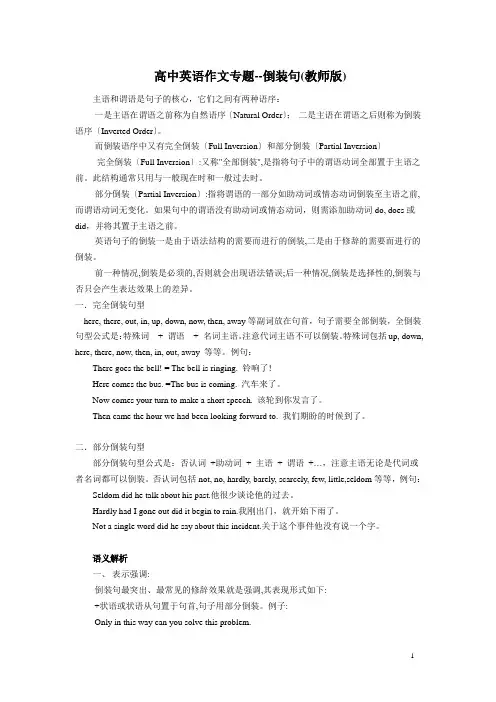
高中英语作文专题--倒装句(教师版)主语和谓语是句子的核心,它们之间有两种语序:一是主语在谓语之前称为自然语序〔Natural Order〕;二是主语在谓语之后则称为倒装语序〔Inverted Order〕。
而倒装语序中又有完全倒装〔Full Inversion〕和部分倒装〔Partial Inversion〕完全倒装〔Full Inversion〕:又称"全部倒装",是指将句子中的谓语动词全部置于主语之前。
此结构通常只用与一般现在时和一般过去时。
部分倒装〔Partial Inversion〕:指将谓语的一部分如助动词或情态动词倒装至主语之前,而谓语动词无变化。
如果句中的谓语没有助动词或情态动词,则需添加助动词do, does或did,并将其置于主语之前。
英语句子的倒装一是由于语法结构的需要而进行的倒装,二是由于修辞的需要而进行的倒装。
前一种情况,倒装是必须的,否则就会出现语法错误;后一种情况,倒装是选择性的,倒装与否只会产生表达效果上的差异。
一.完全倒装句型here, there, out, in, up, down, now, then, away等副词放在句首,句子需要全部倒装,全倒装句型公式是:特殊词+ 谓语+ 名词主语。
注意代词主语不可以倒装。
特殊词包括up, down, here, there, now, then, in, out, away 等等。
例句:There goes the bell! = The bell is ringing. 铃响了!Here comes the bus. =The bus is coming. 汽车来了。
Now comes your turn to make a short speech. 该轮到你发言了。
Then came the hour we had been looking forward to. 我们期盼的时候到了。
二.部分倒装句型部分倒装句型公式是:否认词+助动词+ 主语+ 谓语+…,注意主语无论是代词或者名词都可以倒装。
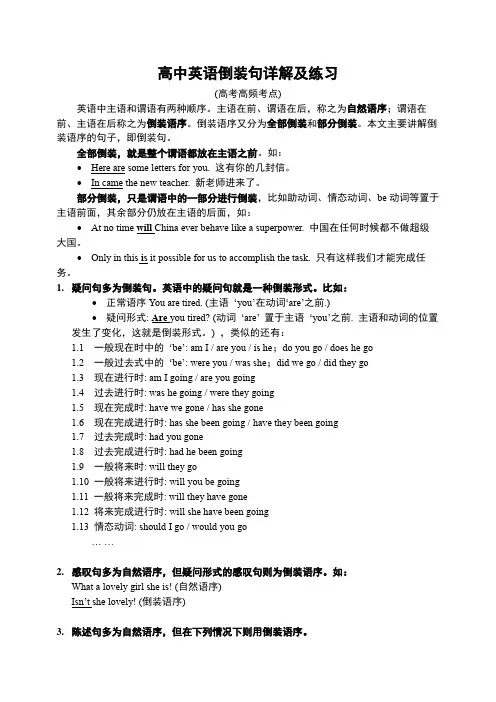
高中英语倒装句详解及练习(高考高频考点)英语中主语和谓语有两种顺序。
主语在前、谓语在后,称之为自然语序;谓语在前、主语在后称之为倒装语序。
倒装语序又分为全部倒装和部分倒装。
本文主要讲解倒装语序的句子,即倒装句。
全部倒装,就是整个谓语都放在主语之前。
如:•Here are some letters for you. 这有你的几封信。
•In came the new teacher. 新老师进来了。
部分倒装,只是谓语中的一部分进行倒装,比如助动词、情态动词、be动词等置于主语前面,其余部分仍放在主语的后面,如:•At no time will China ever behave like a superpower. 中国在任何时候都不做超级大国。
•Only in this is it possible for us to accomplish the task. 只有这样我们才能完成任务。
1.疑问句多为倒装句。
英语中的疑问句就是一种倒装形式。
比如:•正常语序You are tired. (主语‘you’在动词‘are’之前.)•疑问形式: Are you tired? (动词‘are’ 置于主语‘you’之前. 主语和动词的位置发生了变化,这就是倒装形式。
) ,类似的还有:1.1 一般现在时中的‘be’: am I / are you / is he;do you go / does he go1.2 一般过去式中的‘be’: were you / was she;did we go / did they go1.3 现在进行时: am I going / are you going1.4 过去进行时: was he going / were they going1.5 现在完成时: have we gone / has she gone1.6 现在完成进行时: has she been going / have they been going1.7 过去完成时: had you gone1.8 过去完成进行时: had he been going1.9 一般将来时: will they go1.10 一般将来进行时: will you be going1.11 一般将来完成时: will they have gone1.12 将来完成进行时: will she have been going1.13 情态动词: should I go / would you go… …2.感叹句多为自然语序,但疑问形式的感叹句则为倒装语序。
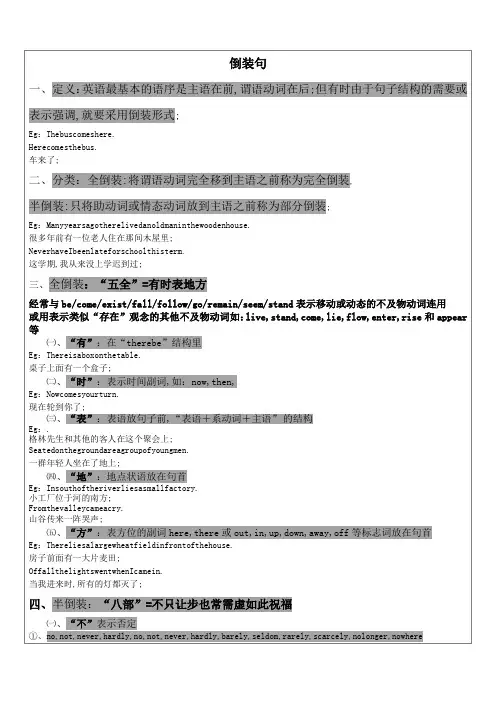
倒装句一、定义:英语最基本的语序是主语在前,谓语动词在后;但有时由于句子结构的需要或表示强调,就要采用倒装形式;Eg:Thebuscomeshere.Herecomesthebus.车来了;二、分类:全倒装:将谓语动词完全移到主语之前称为完全倒装,半倒装:只将助动词或情态动词放到主语之前称为部分倒装;Eg:Manyyearsagotherelivedanoldmaninthewoodenhouse.很多年前有一位老人住在那间木屋里;NeverhaveIbeenlateforschoolthisterm.这学期,我从来没上学迟到过;三、全倒装:“五全”=有时表地方经常与be/come/exist/fall/follow/go/remain/seem/stand表示移动或动态的不及物动词连用或用表示类似“存在”观念的其他不及物动词如:live,stand,come,lie,flow,enter,rise和appear 等㈠、“有”:在“therebe”结构里Eg:Thereisaboxonthetable.桌子上面有一个盒子;㈡、“时”:表示时间副词,如:now,then,Eg:Nowcomesyourturn.现在轮到你了;㈢、“表”:表语放句子前,“表语+系动词+主语”的结构Eg:.格林先生和其他的客人在这个聚会上;Seatedonthegroundareagroupofyoungmen.一群年轻人坐在了地上;㈣、“地”:地点状语放在句首Eg:Insouthoftheriverliesasmallfactory.小工厂位于河的南方;Fromthevalleycameacry.山谷传来一阵哭声;㈤、“方”:表方位的副词here,there或out,in,up,down,away,off等标志词放在句首Eg:Thereliesalargewheatfieldinfrontofthehouse.房子前面有一大片麦田;OffallthelightswentwhenIcamein.当我进来时,所有的灯都灭了;四、半倒装:“八部”=不只让步也常需虚如此祝福㈠、“不”表示否定①、no,not,never,hardly,no,not,never,hardly,barely,seldom,rarely,scarcely,nolonger,nowhereEg:NeverhaveIbeentoBeijing.我从没有没有去过北京;②、绝不:atntime,innoway,bynomeans,onnoaccount,innocase,in/undernocircumstanceEg:Atnotimecanwegiveup.我们决不能放弃;③、Notuntil...:直到Eg:NotuntilmymothercamehomedidIgotobed.知道我妈妈回家我才睡觉;④、Hardly/Scarcely...过完...when...一过...:一...就...Nosooner...过完...than...一过...:一...就...Eg:Hehadhardlygothomewhenithappenedtorain.=Hadhehardlygothomewhenithappenedtorain.他一到家碰巧就下雨了;⑤、Notonly......butalso......:前倒后不倒Eg:Notonlydidherefusethegift,healsoseverelycriticizedthesender.他没有收下礼物,还狠狠批评了送礼的人㈡、“只”:only所修饰的副词、介词短语或状语从句放在句子开头时;Eg:OnlythendidIrealizethatIwaswrong.只有到那时我才意识到我错了;Onlyinthiswaycanyoulearnfromyourmistake.只有用这样的方法你可以从错误中学习;Onlywhenthewarwasoverin1918washeabletogethappilybacktowork.只有当战争于1918年结束时候,他才能够快乐地回到工作当中;※当only之后所接的不是状语时不可以用倒装Eg:OnlyComradeZhangknowsaboutthematter..只有张同志知道这件事;㈢、“让步”:as/though/although引导让步状语从句时要倒装形/副/名/动+as+主语+谓语Eg:Proudastheyare,theyareafraidtoseeme.尽管他们自豪,但是他们还怕见到我;Childasheis,heseemstoknoweverything.child前不加冠词尽管他是个孩子,但他好像知道一切;Hardasheworded,hemadelittleprogress.尽管他努力工作,但是几乎没什么进步;※以上句中as可以替换though/although,但是as更加常用;㈣、“也”:so/nor/neither开头,表示谓语所述的情况也适用于另一个人或一事物的肯定或否定句so用于肯定句,表示“也一样”“也这样”;nor/neither用于否定句,表示“同样也不,也不这样”; Eg:.我正在看电视,她也在看;Myparentsdidn'NordidI.我父母昨晚没有看电视,我也没有看;※表示两人的同样一个情况时,只能表示一件事,即上、下句所使用的动词、时态要一致;㈤、“常”:表示频度副词如:often、manyatime,nowandagain等经常用于正式的文体中Eg:Oftendidheadvisethemnottosmoke.他经常建议他们不要抽烟;㈥、“需=虚拟”:省略if的虚拟条件句,把助动词were、had、should提到主语前面时Eg:Haditnotbeenforyourhelp,weshouldn'thaveachievedsomuch.要不是你的帮助,我们不可能收获这么多;㈦、“如此”:so/such…that…;从句中,当so+形容词/副词或such+名词位于句首时;Eg:Soexhaustedwasshethatshewantedtohavearest.他是如此地疲惫以至于想要休息一下;㈧、“祝福”:当may放在句首,表达祝愿时;Eg:Mayyousucceed祝你成功五、练习题PartOne单项选择.—Whereismyshirt,mum —_________.—Whereisyourfather —Oh,________.—Ithoughtyouwomenwerepresentatthemeeting.—__________.翻译下列句子;要求:先用正常语序翻译,然后再改写成倒装句;1. 学习做饭不仅使孩子们更加独立,给他们一项基本的生活技能,而且还可以让他们远离垃圾食品;notonly…butalso;independent;junkfood原句:倒装:2. 广告不仅让我们了解最新的产品而且还很有娱乐性;notonly…butalso;keepsbinformedof/aboutsth;product;entertaining原句:倒装:3. 直到最后一刻他才告诉我真相;not…until原句:倒装:4. 直到失去健康你才会意识到它的重要性;not…until原句:倒装:5. 只有用这种方法才能拯救她的生命;only…原句:倒装:6. 只有当他们回来时,我才知道发生了什么事;only原句:倒装:7. 我们有如此多的作业要做以至于我们没有时间放松;so…that;relax原句:倒装:8. Emma是如此的迷人以至于所有人的目光都集中在她身上;so…that;focusone’seyeson原句:倒装:9. 汤姆刚到家电话就响了;hardly…when或者nosooner…than,注意时态原句:倒装:10.他从未想到自己经历十多年的努力后,终于能在激烈的竞争中脱颖而出,并赢得这么多的掌声和鼓励;never原句:倒装:PartThree语法填空Onedayayoungmanwasstandinginthemiddleofthetownproclaiming宣告 1 gather,andtheyalladmiredhisheartforitwasperfect.Suddenly,anoldmanappearedandsaid,“Why,yourheartisnotnearlyasbeautifulas2.”Thecrowdandtheyoungmanlookedattheoldman’sheart, piecesputin,buttheydidn’tfitquiteright,andtherewereseveraljagged凹凸不平的,insomeplacesthereweredeepgouges沟槽wherewholepieceswere 5 miss.Theyoungmanlaughed.“Comparingyourheartwithmine,mineisperfectandyoursisamessofscars.”“Yes,”saidtheoldman,“Yourslooksperfect6,everyscarrepresentsapersonto 7,’texact,Ihavesomeroughedges,whichIcherish,becausetheyremindmeof 8 ,andtheotherpersonhasn’treturnedapieceofhisorherhear t 9 24 remind 10 truebeautyis ”参考答案:单项选择:1—5CABBA6—10BBBDA11—15BCCBA16—20BAACC21—25ABADD26—30BDCDC翻译答案:1.Learningcookingnotonlymakeschildrenmoreindependentandgivesthemabasiclifeskill,butalsokeepsthemaw ayfromjunkfood.倒装:Notonlydoeslearningcookingmakechildrenmoreindependent,….2. Advertisementsnotonlykeepusinformedofthelatestproducts,buttheyalsoareentertaining.倒装:Notonlydoadvertisementskeepusinformedofthelatestproducts,….3. Hedidn’ttellmethetruthuntilthelastmoment.倒装:Notuntilthelastmomentdidhetellmethetruth.4. Youwon’trealizetheimportanceofhealthuntilyouloseit.倒装:Notuntilyouloseitwillyourealizetheimportanceofhealth.5. Wecouldsaveherlifeonlyinthisway.倒装:Onlyinthiswaycouldwesaveherlife.6. Iknewwhathadhappenedonlywhentheyreturnedhome.倒装:OnlywhentheyreturnedhomedidIknowwhathadhappened.7. Wehavesomuchhomeworktodothatwedon’thavetimetorelax.倒装:Somuchhomeworkdowehavetodothatwedon’thavetimetorelax.8. Emmaissoattractivethateveryonefocusestheireyesonher.倒装:SoattractiveisEmmathateveryonefocusestheireyesonher.9. Tomhadhardlygothomewhenthebellrang.倒装:HardlyhadTomgothomewhenthebellrang.Tomhadnosoonergothomethanthebellrang.倒装:NosoonerhadTomgothomethanthebellrang.语法填空:。
高中英语语法倒装句讲解及练习(附答案)In high school English。
there are two types of inverted sentences: XXX.Complete XXX the verb before the subject。
This structure is typically used in the present and past tenses。
Common structures include:1.Adverbs such as "here," "there," "now," "then," and "thus"at the beginning of the sentence。
XXX "be," "come," "go," "lie," and "run" that XXX or state。
For example: "Then came the chairman" or "Here is your letter."2.XXX "up," "down," "out," "away," "in," "off," and "ahead" at the beginning of the sentence。
For example: "Up jumped thecat and caught the mouse" or "Ahead XXX."3.nal phrases indicating n。
倒装句的用法英语倒装句分为两种:1、整个谓语在前的句子,叫完全倒装。
Here comes the car.2、部分谓语(情态动词、助动词、连系动词)在前,谓语的主体部分仍在主语之后的句子,叫部分倒装句。
Only the n did he realize that he was wrong.必须弄清的两点:①若有主从句,哪句倒装。
②部分倒装还是完全倒装。
一、表示方位和时间的副词位于句首时(now ,the n here ,there,out ,i n ,up,dow n ,away ,back, off,on ),句子全部倒装。
注:主语是代词时,不倒装。
(如5, 6)1. Here comes the bus .2. There goes the bell .3. Away went the stude nts .4. Now comes the cha nee .Out rushed the childre n. he rushed.There comes the bus. he comes.注意:1.不能用进行时; 2.主语为人称代词时不倒装。
二、以介词短语表示的状语,提前位于句首时,全部倒装。
1.ln a lecture hall of a uni versity in En gla nd sits a professor .2.ln front of our school sta nds a tower .3. By either side of the river grow a lot of apple trees .4. At the top of the mountain sta nds a temple .5. Among the goods are Christmas trees,flowers and toys.三、表语位于句首时,倒装结构为“表语+连系动词+主语”A:形容词+连系动词+主语例I.Present at the meeting were Professor White,Professor Smith and many other guests.例2.过去分词+连系动词+主语Gone are the days whe n they could do what they liked to the Chin ese people.四、将so\neither \nor放在开头,表示“…也(不)…”的意思时,部分倒装注:表示“确实是这样”时,不倒装1. He went to the film last night.So did I .2. You must finish your work ,so must I .3.She is in terested in the story ,so am I .4. He didn ' t turn up .Neither did his brother .5. His mother told him not to go to the film .So he did.五、在if条件句中,通常可以省略if ,而将从句倒装条件:在if条件句,必须含有系动词were, 助动词had 和情态动词shouldI. Were he youn ger(=lf he were youn ger ),he would lear n skati ng .2.Should they forget (=If they should forget ) to bring a map with them ,they would get lost in the woods .3. Had they realized (=If they had realized ) how important the task was ,they wouldn ' t have refused to accept .4. Were I you ,I would help her .六、否定词或半否定词(never .little ,seldom ,not ,nowhere ,scarely ,few ,by no means ,at no time ) 位于句首 , 应部分倒装1. Never have I been there .2. Little did I know about it .3.Seldom did she come late to school .4.Not a single mistake did he make .5. By no means should you buy that kind of car .七、 以 notun til ,no sooner …tha n , hardly…whe n ,not only …but also 所弓丨导的状语放 在句首时 ,需要部分倒装 1. Not until 10 'clock will the library open .2. No sooner had I gone out than he came to see me .3. Hardly had the train arrived when I ran to meet my friend.4. Not only does she speak English but also she follows the British way of life .八、 only 及其修饰的状语位于句首时,后面的句子部分倒装。
Grammar of the Inversion (Module 5 Unit 4)倒装句英语最基本的语序是主语在前,谓语动词在后。
但有时由于句子结构的需要或表示强调,就要采用倒装形式。
倒装分两种情况: 1)将谓语动词完全移到主语之前称为完全倒装,2)只将助动词或情态动词放到主语之前称为部分倒装。
并且强调性倒装和以so, neither, nor开头的句子是高考例题的热点。
一、倒装句的意义1. 用倒装构成疑问句,适应一定的语法结构的需要.e。
g. May I come in?Was the People's Liberation Army founded in 1927?2。
为了强调某一部分,而把这部分放到句首,构成倒装.e.g. Never have I been late for school this term.So early did he come to school that no other students came.二、倒装的用法完全倒装1. 在“there be”结构里,there是引导词,主语在be后.在“there + be”结构中的谓语动词有时不用be , 而用表示类似“存在"观念的其他不及物动词。
如:live, stand, come, lie, flow, enter, rise 和appear等。
e.g. There is a box on the table。
There came shouts for help from the river.There lies a large wheat field in front of the house.Many years ago there lived an old man in the wooden house.2. 为了表达生动,有时把表地点、方位的副词,如here, there, now , then, , thus , up,down, out,off, over, away, in等放在句首,同时把谓语动词放在主语之前,在here, there等副词开头的某些句子里(要用一般现在时态).若主语为人称代词,主语和谓语动词的位置不变,只将副词放在句首。
高中英语倒装句倒装句分为全部倒装和部分倒装1全部倒装全部倒装是只将句子中的谓语动词全部置于主语之前。
此结构通常只用于一般现在时和一般过去时。
常见的结构有:1)here, there, now, then, thus等副词置于句首, 谓语动词常用be, come, go, lie, run等表示来去或状态的动词。
例如:Then came the chairman. 那时总裁来了。
Here is your letter. 你的信。
2). up,down,out,away,in , off, ahead放于句首Up jumped the cat and caught the mouse.Ahead sat an old woman.3)表示地点,时间,方向等的介词短语放在句首时例如:After the head walked a group of workers.4.“作表语的现在分词/过去分词/形容词+系动词+主语”形式的完全倒装Seated in the front were the guests.注意:上述全部倒装的句型结构的主语必须是名词,如果主语是人称代词则不能完全倒装。
例如:Here he comes. 他来了。
Away they went. 他们走开了。
2部分倒装部分倒装是指将谓语的一部分如助动词或情态倒装至主语之前。
如果句子的谓语没有助动词或情态动词,则需添加助动词do, does或did,并将其置于主语之前。
1. 句首为否定或半否定的词语,如no, not, never, seldom, little, hardly, rarely, scarely, in no way, under no circumstance, at no time决不, not until…等。
例如:Never have I seen such a performance. 从未见过如此糟糕的表演。
Nowhere will you find the answer to this question. 无论如何你不会找到这个问题的答案的。
高中英语倒装句讲解以及习题-CAL-FENGHAI.-(YICAI)-Company One1倒装句一、定义:英语最基本的语序是主语在前,谓语动词在后。
但有时由于句子结构的需要或表示强调,就要采用倒装形式。
Eg:The bus comes here.Here comes the bus.车来了。
二、分类:全倒装:将谓语动词完全移到主语之前称为完全倒装,半倒装:只将助动词或情态动词放到主语之前称为部分倒装。
Eg:Many years ago there lived an old man in the wooden house.很多年前有一位老人住在那间木屋里。
Never have I been late for school this term.这学期,我从来没上学迟到过。
三、全倒装:“五全”=有时表地方经常与be/come/exist/fall/follow/go/remain/seem/stand(表示移动或动态的不及物动词连用)或用表示类似“存在”观念的其他不及物动词如:live, stand, come, lie, flow, enter, rise 和appear等㈠、“有”:在“there be”结构里Eg:There is a box on the table.桌子上面有一个盒子。
㈡、“时”:表示时间副词,如:now,then,Eg:Now comes your turn.现在轮到你了。
㈢、“表”:表语放句子前,“表语+系动词+主语”的结构Eg:Present at the party were Mr. Green and many other guests.格林先生和其他的客人在这个聚会上。
Seated on the ground are a group of young men.一群年轻人坐在了地上。
㈣、“地”:地点状语放在句首Eg:In south of the river lies a small factory.小工厂位于河的南方。
高中倒装句(教师版)英语最基本的语序是主语在前,谓语动词在后。
但有时由于句子结构的需要或表示强调,就要采用倒装形式。
将谓语动词完全移到主语之前称为完全倒装,只将助动词或情态动词放到主语之前称为部分倒装。
强调性倒装和以so,neither,nor开头的句子是高考例题的热点。
一、倒装句的意义1. 适应一定的语法结构的需要,主要是指疑问句句型结构的需要。
e.g. May I come in?Was the People's Liberation Army founded in 1927?2. 为了强调某一部分,而把这部分放到句首,构成倒装。
e.g. Never have I been late for school this term.So early did he come to school that no other students came.二、倒装的用法1. 在“there be”结构里,there是引导词,主语在be后。
在“there + be”结构中的谓语动词有时不用be , 而用表示类似“存在”观念的其他不及物动词。
如:live, stand, come, lie, flow, enter, rise 和appear等。
e.g. There is a box on the table.There came shouts for help from the river.There lies a large wheat field in front of the house.Many years ago there lived an old man in the wooden house.2. 在疑问句中。
e.g. Is she singing in the classroom?What does your mother do?3. 在here,there等副词开头的某些句子里(要用一般现在时态)。
如果主语是人称代词,主语和主要动词的词序不变。
(完全倒装)e.g. There goes the bell. Here is an apple for you. There she comes.Ex:There ________. And here ________.A.goes the phone; she comesB. is the phone going; is sheC. does the phone go; does she comeD. the phone goes; come she4. 重复倒装句型,用在以so,nor,neither开头,表示谓语所述的情况也适用于另一个人或事物的肯定或否定句中。
so用于肯定句,表示“也一样”“也这样”;nor,neither用于否定句,表示“同样也不,也不这样”。
e.g. I am watching TV. So is she.My parents didn't watch TV last night. Neither (Nor)did I.She is busy doing her homework. So is her brother.You passed the exam. So did I.He doesn’t like shopping. Neither do i.He can’t speak any foreign language. Nor can his father.表示两人的同样一个情况时,只能表示一件事,即上、下句所使用的动词、时态要一致。
否则要用so it is with…His uncle is a worker and has been working in the factory for more than ten years. So it is with his aunt.Ex:1)I don't know how to swim, ____.A. and my sister doesn't neitherB. nor my sister canC. nor does my sisterD. and my sister does either2)She's passed the test. ____. A. So am I B. So have I C. So I have D. Also I have5. 直接引语的全部或一部分放在句首时,主句中的主谓也常直接倒装。
(完全倒装)e.g. "Very well," said the French student."Bring me two eggs and a cup of tea,please." said he.6. 在以hardly(scarcely), never, not, not only, little, few,seldom, no sooner…(than), not until, no where等否定或半否定意义的副词、连词放在句首时要用倒装句,采用部分倒装。
如不放在句首就不要倒装。
e.g. Little did he say at the meeting.Never shall I forget the day when I joined the Army.Hardly(Scarcely) had he reached the station when the train started.Not once did we visit the city of our own.Seldom in all my life have I met such a determined person.Not only was there no electricity, but also no water.Not until he shouted at the top of his voice did she turn her head.比较:I shall never forget the day when I joined the Army.Ex:1) Hardly ________ the airport when the plane took off. A. I had arrived at B. had I arrived C. had I reached D. I had got to2) —Have you ever seen anything like that before? —No, ________ anything like that before.A. I never have seenB. never I have seenC. never have I seenD. I have seen7. 用于以only所修饰的副词、介词短语或状语从句的句子中。
e.g. Only when the war was over in 1918 was he able to get happily back to wrk.Only in this way can we learn English well.注意:如果only后的词组不是状语,不需倒装。
e.g. Only Wang Lili knows this. onlyOnly a few young men went to the theatre. (修饰主语时则不用倒装)Ex:1)Only in this way ___ make progress in your English. A. you B. can you C. you be able to D. will you able to2) Only when the meeting was over___ go back to meet his friend. A. he could B. he was able to C. was he able to D. was able to he3)Only after liberation___ to be treated as human beings.A.did they beginB. they had begunC.they did beginD. had they begun8. 为了表达生动,有时把表地点、方位的副词,如up,down,out,away,in等放在句首,同时把谓语动词放在主语之前。
若主语为人称代词,主语和谓语动词的位置不变,只将副词放在句首。
(完全倒装)e.g. Away hurried the boy.Out rushed the girl.Away she went with tears in her eyes.Ex:Out ____, with a stick in his hand. A. did he rush B. rushed he C. he rushed D. he did rush表示地点的介词短语(如on the wall, under the tree, in front of the house, in the middle of the room等)放在句首时,要全部倒装。
如:On the top of the hill stands a pine tree.In front of the classroom is a playground.Ex:Under a big tree ________, half asleep.A. did sat a fat manB. a fat man satC. did a fat man satD. sat a fat man9. 在虚拟结构中,条件从句的谓语含有were,had 和should这三个词是,可省去if,将这些词移至主语之前。
e.g. Had I time (= If I had time),I would go and help you.Were I you (= If I were you),I would go abroad.Should he come (=If he should come),tell him to ring me up.10. as引导让步状语从句时要倒装(形容词/ 副词/ 名词/ 动词+ as + 主语+ 谓语)。
e.g. Proud as they are,they are afraid to see me.Child as he is,he seems to know everything.(child前不加冠词)Hard as he worded,he made little progress.Ex:________, he's honest.A. As he is poorB. Poor is heC. Poor as he isD. Poor as is he_____, he knows a lot of things.A. A child as he isB. Child as he isC. A child as is heD. Child as is he11. 用于某些表示祝愿的句子里。